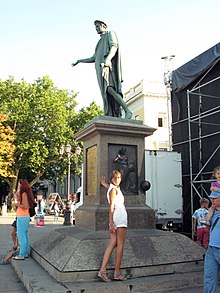Armand Emmanuel du Plessis, duc de Richelieu
Armand du Plessis , completely Armand Emmanuel Sophie Septemanie du Plessis (born September 25, 1766 in Paris ; † May 17, 1822 ibid), Count of Chinon , since 1791 the 5th Duke of Fronsac , 5th Duke of Richelieu and Peer of France ; was a French and Russian statesman.
Life
His father was Louis Antoine du Plessis, Duke of Fronsac and son of Marshal de Richelieu (1696–1788). The Comte de Chinon, as he was known as the Richelieu heir, was married at the age of fifteen to Rosalie de Rochechouart, a misshapen twelve-year-old child with whom he never had more than a formal relationship. After two years of traveling abroad, he was accepted into the Dragoons and was given a position at court the next year, where he gained a reputation for puritanical simplicity. He went to Vienna in 1790 and joined the Russian army as a volunteer with his friend Prince Charles de Ligne ; on November 21st he reached the Russian headquarters in Bender .
He took part in the conquest of Ismajil and received the St. George's cross and a golden sword from Tsarina Catherine II . After the death of his father in February 1791, he took over the title of Duke of Richelieu. He was shortly afterwards by Louis XVI. called to Paris; but since he did not enjoy sufficient trust at court, he was not initiated into the planned escape to Varennes. In July he received a passport from the National Assembly to go to Russia.
In 1792 he was temporarily in command of the Chevaliers-dragons de la couronne in the army of emigrants .
He was accepted into the Académie Française in 1816 . Armand du Plessis died of a stroke in 1822.
job
He was promoted to major general in the Russian army, but was intrigued by his enemies to resign. At the request of the Russian government, his name was deleted from the list of emigrants. In 1803 he became the governor of Odessa . He actively supported the German emigrants who arrived in Odessa in 1803, from whom the ethnic group of the Black Sea Germans later emerged. He let them spend the night in barracks during the first winter and arranged for land purchases to settle them.
In 1805 Richelieu was named governor-general of Kherson , Yekaterinoslav and the Crimea , at the time New Russia . In the eleven years of his administration, Odessa grew into an important city, whose economic development he decisively promoted. He commanded a division in the Turkish War of 1806/07 and was often busy with expeditions to the Caucasus.
Richelieu returned to France in 1814; on Napoleon's triumphant return from Elba, he accompanied Louis XVIII. to Lille. From there he went back to Vienna to return to the Russian army, believing that he could best serve the interests of the monarchy and France by supporting Tsar Alexander . Although he was unable to get back most of his confiscated property, he did not share the resentment of the majority of returning emigrants, from whom and from whose intrigues he had stayed away during his exile. He did not share her idea that the revolution should be reversed. As a personal friend of the Russian Tsar, his influence in the Allied councils would have been of great use. However, he turned down Talleyrand's offer of a position in the cabinet, pointing to his long absence from France and ignorance of the French situation. After Talleyrand's withdrawal, however, he agreed to succeed him as Prime Minister, although - as he himself said - he did not know the face of any of his colleagues.
The events of Richelieu's tenure are detailed in the context of the Restoration . It should only be mentioned here that it was largely thanks to his efforts that France was freed from the burden of Allied occupation so early. It was mainly with this aim that he took part in the Aachen Congress in 1818. There he was informed in confidence of the renewal of the treaty which obliged the Allies to intervene in the event of renewed revolutionary disturbances; partly because of this knowledge, he resigned from office in December of the same year as his colleagues opposed a reactionary amendment to the electoral law. After the murder of the Duke of Berry and the forced resignation of Decazes , he was once again President of the Conseil des Ministres (February 20, 1820); but his position became untenable because of attacks from the ultras on the one hand and the liberals on the other, and he resigned again on December 12, 1821, only a few months before his death.
After his death, the people of Odessa erected a monument to him on Primorsky Boulevard in 1828. It shows the former governor in the pose of a Roman statesman with a toga .
Web links
- Short biography and list of works of the Académie française (French)
- Personal article in the Britannica encyclopedia
| personal data | |
|---|---|
| SURNAME | Richelieu, Armand Emmanuel du Plessis, duc de |
| ALTERNATIVE NAMES | Richelieu, Armand Emmanuel Sophie Septemanie du Plessis, Duke of; Du Plessis, Armand Emmanuel |
| BRIEF DESCRIPTION | French and Russian statesman |
| DATE OF BIRTH | September 25, 1766 |
| PLACE OF BIRTH | Paris , France |
| DATE OF DEATH | May 17, 1822 |
| Place of death | Paris |

